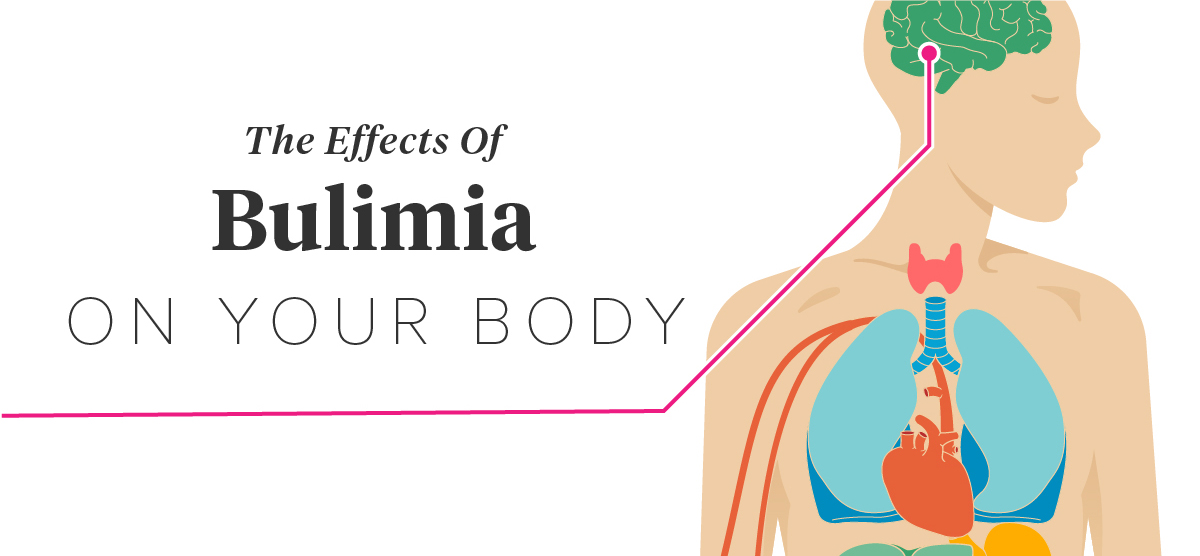Bulimia nervosa often referred to simply as bulimia, is a serious mental disorder. It is characterized by binge eating and purging behaviors. People with bulimia often feel out of control when it comes to food, and they may feel ashamed or embarrassed about their behavior. If you are concerned that you or someone you know may have bulimia, it is important to seek help.
Contents
What Is Bulimia?
 Bulimia is an eating disorder characterized by bingeing and purging. People with bulimia often eat large amounts of food in a short period, followed by vomiting, fasting, or over-exercising to prevent weight gain. Bulimia can be a serious and life-threatening condition. Bulimia is also one of the most difficult eating disorders to treat.
Bulimia is an eating disorder characterized by bingeing and purging. People with bulimia often eat large amounts of food in a short period, followed by vomiting, fasting, or over-exercising to prevent weight gain. Bulimia can be a serious and life-threatening condition. Bulimia is also one of the most difficult eating disorders to treat.
There are two types of bulimia: purging and non-purging bulimia. Purging bulimia is when a person uses vomiting, laxatives, or diuretics to get rid of the food they have eaten. Non-purging bulimia is when a person doesn’t purge but uses other methods such as fasting or over-exercising to make up for the calories they have consumed.
Bulimia can cause serious health problems, including dehydration, electrolyte imbalance, heart problems, and gastrointestinal problems. Bulimia can also lead to social isolation and anxiety. If you think you or someone you know has bulimia, it’s important to get help from a doctor or mental health professional.
Around a million people in the world have bulimia. Bulimia is more common in women than men and usually starts during adolescence or young adulthood. If you think you may have bulimia, talk to your doctor or mental health professional. They can help you get the treatment you need.
Treatment for bulimia often includes counseling and therapy, as well as medication. Treatment focuses on helping people with bulimia develop healthy eating habits and cope with their feelings.
What Are the Warning Signs of Bulimia?

The warning signs of bulimia can be difficult to spot because people with bulimia often try to keep their disorder a secret. Some warning signs of bulimia include:
Eating large amounts of food in a short period
This is one of the most common warning signs of bulimia. People with bulimia often eat large amounts of food in a short period and then feel guilty or ashamed afterward. When you are feeling out of control around food, it can be a warning sign that you are developing bulimia.
Complaining of stomach issues
Another common warning sign of bulimia is complaining of stomach issues. People with bulimia often purge after eating, which can cause abdominal pain and other gastrointestinal problems. If you are frequently complaining of stomach issues, it could be a sign that you are suffering from bulimia. Sometimes, people with bulimia will also use laxatives to purge, which can also cause stomach issues.
Skipping meals
People with bulimia often skip meals or restrict their food intake to prevent themselves from overeating. If you are frequently skipping meals or restricting your food intake, it could be a sign that you are developing bulimia. It can also be a sign that you are already suffering from bulimia and are trying to control your food intake.
Excessive exercise
Excessive exercise is another common warning sign of bulimia. People with bulimia often exercise excessively to burn off the calories they have consumed. If you are exercising excessively, it could be a sign that you are developing bulimia.
Constant dieting
People with bulimia often go on crash diets or engage in constant dieting to lose weight. If you are always dieting or restricting your food intake, it could be a sign that you are developing bulimia. Sometimes, people with bulimia will also use laxatives to purge, which can also cause stomach issues.
Feeling out of control around food
This is one of the most common symptoms of bulimia. You feel like you can’t control your eating habits, and as a result, you often binge eat. This can lead to feelings of shame and guilt, which only fuels the cycle of binging and purging. It can also cause you to miss out on important nutrients, which can lead to serious health problems.
Feeling To Vomit
One of the most common symptoms of bulimia is the feeling that you need to vomit. This can be triggered by several things, including:
- Eating too much food
- Feeling stressed or anxious
- Seeing or smelling food that you don’t want to eat
The feeling of needing to vomit can be so strong that you may do it even if you’re not near a toilet. This can lead to problems like dehydration and weight loss. If you’re vomiting frequently, you may also start to feel lightheaded and dizzy. These are all signs that you need to get help for your bulimia.
Complaining about body image
This is an issue that is very prevalent in society today. It seems like everywhere you look, an ad or a person is telling you that you need to lose weight or change the way you look. This can be extremely tough to deal with, especially if you are already unhappy with your appearance. Bulimia is an eating disorder that can develop from the constant pressure to be thin.
Binge eating
Binge eating is when you eat a large amount of food in a short period. This can be triggered by stress, boredom, or hunger. Binge eating can be extremely detrimental to your health as it causes your blood sugar levels to spike and crash. This can lead to weight gain, diabetes, and other health problems.
Purging
Purging is when you try to get rid of the food you have just eaten by vomiting, using laxatives, or over-exercising. This can be extremely dangerous as it can lead to dehydration, electrolyte imbalance, and other health problems.
These are some of the signs of bulimia. If you or someone you know is exhibiting these signs, it is important to seek help from a qualified professional. Bulimia is a serious disorder that can have many negative consequences on your health. If you are struggling with bulimia, please seek help as soon as possible.
Different Types of Bulimia
 There are many types of bulimia, each with its own set of symptoms and behaviors. The most common types are:
There are many types of bulimia, each with its own set of symptoms and behaviors. The most common types are:
Purging Type
Purging type bulimia is characterized by frequent episodes of binge eating followed by purging. This can be done through vomiting, the use of laxatives, or over-exercising. Purging type bulimia is the most common type of bulimia. Purging type bulimia usually starts in adolescence and is more common in women than men. This type of bulimia is more likely to lead to serious health problems such as electrolyte imbalance, dehydration, and heart problems.
Non-Purging Type
Non-purging type bulimia is characterized by binge eating without purging. This can be done by fasting, excessive exercise, or the use of diuretics. Non-purging type bulimia usually starts in adulthood and is more common in men than women. This type of bulimia is less likely to lead to serious health problems but can still cause significant weight fluctuations. In some cases, it can also lead to eating disorders such as anorexia nervosa. Sometimes, people with non-purging type bulimia also have purging type bulimia.
What Are Different Reasons for Bulimia?

There are many reasons that people develop bulimia. For some, it may be a way to cope with an underlying mental health disorder, such as depression or anxiety. For others, it may be a way to deal with feelings of low self-esteem or body dissatisfaction. And for some people, it may be a way to control their weight or shape.
Some of these reasons are:
Stress
One of the most common triggers for bulimia is stress. This can be any type of stress, including academic, work-related, or personal stressors. When people are under a lot of pressure, they may turn to bulimia as a way to cope. Sometimes, the act of purging can provide a temporary sense of relief from the stressors in their life. There maybe be other coping mechanisms that can be more effective in the long run, such as exercise, journaling, or talking to a therapist.
Depression
Depression is another common trigger for bulimia. For some people, depression may lead to feelings of low self-worth, which can trigger body dissatisfaction. This may cause them to turn to bulimia as a way to control their weight or shape. If you think you may be depressed, it’s important to talk to your doctor or mental health professional. There are many treatment options available for depression, and it’s important to get help if you’re struggling.
Anxiety
Anxiety is another mental health disorder that can trigger bulimia. For some people, anxiety may lead to feelings of low self-esteem, which can trigger body dissatisfaction. This may cause them to turn to bulimia as a way to control their weight or shape. If you think you may be struggling with anxiety, it’s important to talk to your doctor or mental health professional. There are many treatment options available for anxiety, and it’s important to get help if you’re struggling.
Body Dissatisfaction
One of the most common triggers for bulimia is body dissatisfaction. This can be a result of societal pressure to look a certain way, media images that portray an “ideal” body type, or even just personal insecurity. If you’re not happy with your body, it can be difficult to resist the urge to diet or engage in other unhealthy weight-loss behaviors. If you’re struggling with body dissatisfaction, it’s important to talk to a therapist or counselor who can help you learn to love and accept your body.
Low Self-Esteem
Low self-esteem is another common trigger for bulimia. If you don’t feel good about yourself, you may be more likely to engage in unhealthy behaviors like purging. Low self-esteem can be caused by many things, including media images that portray an “ideal” body type, societal pressure to look a certain way, or personal insecurity. If you’re struggling with low self-esteem, it’s important to talk to a therapist or counselor who can help you learn to love and accept yourself.
There are many reasons that people develop bulimia. If you think you may be struggling with bulimia, it’s important to talk to your doctor or mental health professional.
Stages of Bulimia
There are many different stages of bulimia, each with its own set of symptoms and severity.
The first stage is known as the “binge-purge” stage. This is when a person begins to binge on large amounts of food, often in secret, and then purge it through vomiting or using laxatives. As the disorder progresses, the binges become more frequent and the purging becomes more extreme. A person may start to use diuretics or enemas to purge food, or they may exercise excessively to burn off calories.
The second stage is known as the “restrictive” stage. This is when a person begins to severely restrict their intake of food and calories. They may become obsessed with counting calories and exercising, and they may start to lose a significant amount of weight. This can be a very dangerous stage, as it can lead to severe malnutrition and even death.
The third and final stage is known as the “chronic” stage. This is when a person’s bulimia has become so severe that it interferes with their daily life and causes them significant distress. They may miss work or school due to their disorder, and they may have difficulty maintaining relationships. This is the most serious stage of bulimia, and it can be extremely difficult to recover from.
These are some of the stages of bulimia that a person may go through.
How Does Bulimia Effects, Someone?

Sometimes bulimia can be hard to spot because the person suffering may be of normal weight or even overweight. Bulimia usually starts with an innocent diet to lose weight. The person then becomes obsessed with their weight and body shape. They will frequently go on binges where they eat large amounts of food, often in secret. This is followed by purging, which can be done in several ways including self-induced vomiting, over-exercising, fasting, or taking laxatives.
Bulimia takes a toll on the whole body, both physically and emotionally. It can cause long-lasting damage to teeth and gums from the stomach acid brought up during purging. It also causes dehydration and electrolyte imbalances which can lead to heart problems. Emotionally, bulimia can cause feelings of shame and isolation. It can also lead to depression and anxiety.
It also impacts a person’s social life. They may start to miss school or work as they struggle to keep up with the bingeing and purging cycle. They may withdraw from friends and family.
How To Treat Bulimia?
Treating bulimia can be a difficult and lengthy process, but it is possible. The first step is to seek professional help from a therapist or counselor who specializes in eating disorders.
This professional can help you understand the underlying causes of your bulimia and develop a treatment plan to address them.
Some of the treatment options are:
Medications
One of the most common medications used to treat bulimia is an antidepressant. Antidepressants can help reduce the frequency and intensity of binge-eating and purging episodes. These medications are also effective in treating the anxiety and depression that often accompany bulimia.
Cognitive-behavioral therapy (CBT)
CBT is a type of therapy that focuses on changing negative thought patterns and behaviors. CBT is an effective treatment for bulimia, helping people to reduce the frequency of bingeing and purging episodes.
Interpersonal psychotherapy (IPT)
IP is a type of therapy that focuses on resolving interpersonal issues, such as conflict within relationships. IPT is an effective treatment for bulimia, helping people to reduce the frequency of bingeing and purging episodes.
Nutritional counseling
Nutritional counseling can help you develop healthy eating habits and make better food choices. A registered dietitian can help you understand the role of nutrition in maintaining a healthy weight and preventing bingeing and purging episodes.
Support groups
There are many support groups available for people with bulimia. These groups provide an opportunity to share experiences and learn from others who are going through similar challenges. Support groups can be an important part of treatment, helping to reduce isolation and providing motivation to stick with treatment.
Self-Care
A healthy lifestyle is an important part of treatment for bulimia. Eating a balanced diet, getting regular exercise, and getting enough sleep can help reduce the frequency and intensity of bingeing and purging episodes.
It is also important to find ways to reduce stress in your life. Some healthy coping mechanisms include journaling, yoga, meditation, and spending time outdoors.
How To Prevent Bulimia?

Preventing Bulimia Nervosa is not easy. It requires a lot of time, energy, and effort. However, it is possible to do so with the right treatment and support. There are various ways to prevent Bulimia Nervosa, which include:
Identifying the triggers that lead to Bulimic episodes
One of the main ways to prevent Bulimia Nervosa is by identifying the triggers that lead to bulimic episodes. Once these triggers are identified, it becomes easier to avoid them or healthily deal with them.
Educating yourself about the disorder
Another way to prevent Bulimia Nervosa is by educating yourself about the disorder. This includes learning about the causes, symptoms, and treatment options. The more you know about Bulimia Nervosa, the better equipped you will be to deal with it.
Building a support system
A support system can be incredibly helpful in preventing Bulimia Nervosa. This might include friends, family, or a therapist. These people can provide emotional support and help you stay on track with your treatment.
Participating in therapy
Therapy is an important part of preventing Bulimia Nervosa. It can help you learn healthy coping mechanisms, identify unhealthy thought patterns, and develop a plan to prevent future episodes.
Bulimia Nervosa is a serious disorder that requires professional treatment. However, there are things that you can do to prevent it from happening or getting worse.
Conclusion
Bulimia is a serious eating disorder that can have long-lasting effects on your physical and mental health. If you think you may have bulimia, it’s important to seek professional help. With treatment, you can overcome bulimia and live a healthy, happy life.
There are many types of treatment available for bulimia, including therapy, counseling, and medication. The most important thing is to find a treatment that works for you. If one type of treatment doesn’t seem to be helping, don’t give up. There are many options available, and with time and patience, you will find the right one for you.
If you or someone you know has bulimia, there is help available. Some resources can provide more information about bulimia and eating disorders.
Hope this article was of help to you! If you are suffering from bulimia, you may seek help from Therapy Mantra. We have a team of highly trained and experienced therapists who can provide you with the tools and skills necessary for overcoming bulimia. Contact us today to schedule an online therapy or download our free Android or iOS app for more information.


